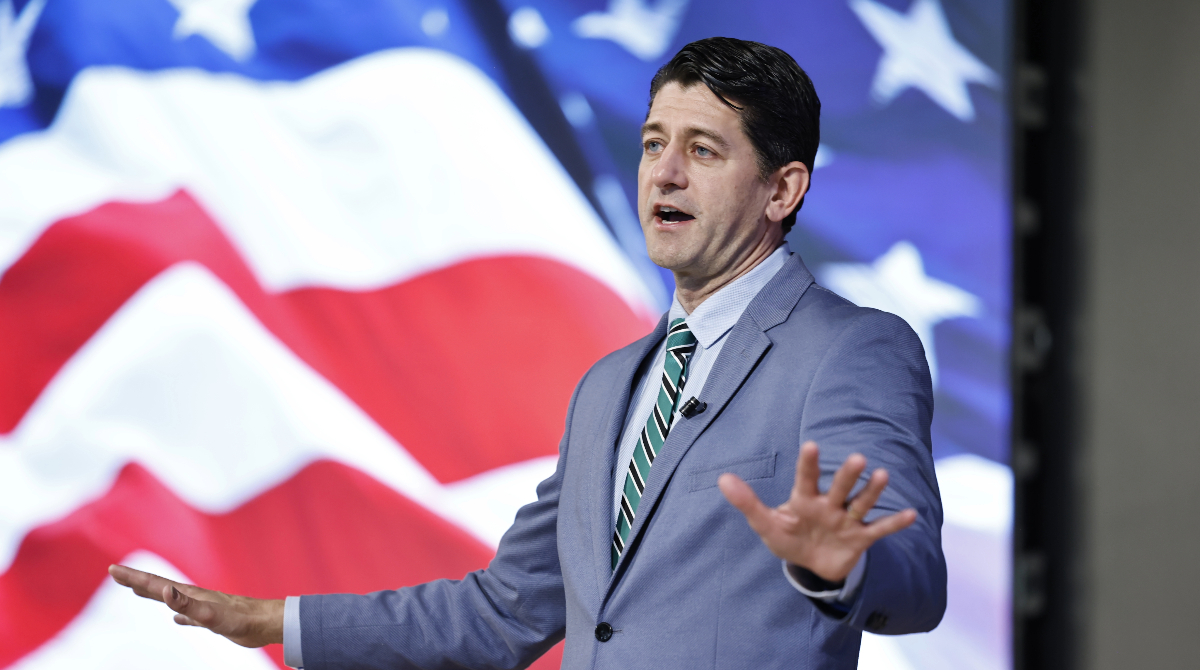Paul Ryan, a former speaker of the United States House of Representatives, told Utah Valley University students, faculty, staff, and guests that two stress tests are currently playing out in American society — one from within and another from without.

Paul Ryan, a former speaker of the United States House of Representatives, told Utah Valley University students, faculty, staff, and guests that two stress tests are currently playing out in American society — one from within and another from without. Ryan, a self-described “recovering politician,” spoke as a guest lecturer for the Woodbury School of Business’ Reed and Christine Halladay Executive Lecture Series in partnership with the Gary R. Herbert Institute for Public Policy.
“From within, we are a self-determining country. We are a democracy; we determine how we govern ourselves, and if you are looking at the TV today, it doesn’t look like we are governing ourselves really well,” Ryan said. “I’d say at the root of this is the fact that we have this hyperpolarization that is alive and well in America. We are tearing each other apart.”
Directing his comments to students, Ryan said they are coming into a society with “really good opportunities” but also some significant challenges of the digital age.
“We are going online and spending our time and our days in our own little cul-de-sac where the algorithms are giving us our biases back to us,” Ryan said. “Where the cable station we are on, the news feed we get, the friend group we have, the social media influencers we look at — these are all feeding us our biases, and they are telling us that other people who aren’t like us, don’t look like us, or don’t think like us are bad people. So, we have this tribalization that is being accelerated with all of this.”
Ryan went on to say that money is the motivation for creating polarizing content. “If you take a look at the money that can be made on the internet, it is not on making us happier, it is not on making us more pluralistic and tolerant, it is not on making us work together and build up civil society — it is on the darker emotions. They are monetizing the emotions that divide us.”
Ryan also pointed to the media as the motivation behind what he calls the new wing of Democrats and Republicans. “It’s called the entertainment wing,” he said. “We have folks going to office who are there to entertain, there to provoke and build a brand and get hits and clicks, and not to make compromises, not to collaborate, not to come together and solve problems for their constituents. They are the loudest voices. We do not have political leaders doing the right thing.”
Social media also impacts global politics, Ryan said, identifying the external stress test now facing the nation in the strained relations between the U.S., Russia, and China. According to Ryan, those fighting against democracy use communication technology to further their advances.
“They are basically saying we are better than democracy,” Ryan said. “We are meaner and nimbler and can do more than democracy. We are being stressed by these governments, by these techno-tyrannies.”
Ryan said to fix the problems at home and abroad, voters need to demand serious politicians who provide more than rhetoric. “Our end is not in front of us; we just need to get out and act together, reduce political polarization, work on solutions, get more serious politicians in government, and we’re there,” he said.
The former House speaker shared a quote often attributed to Winston Churchill: “‘Americans always do the right thing, but only after exhausting all other possibilities.’” He added, “We live in the greatest country on earth. It is really up to us whether or not we can weather these challenges.”